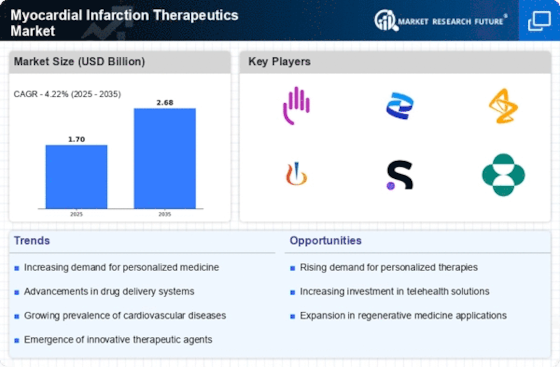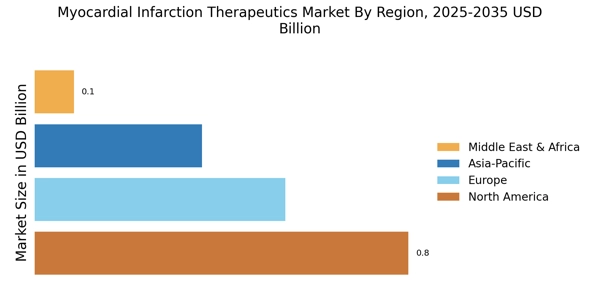Rising Awareness and Education
Increased awareness and education regarding myocardial infarction and its risk factors are driving the Myocardial Infarction Therapeutics Market. Public health campaigns and educational initiatives have led to a better understanding of the importance of early detection and treatment of myocardial infarction. This heightened awareness is encouraging individuals to seek medical attention promptly, thereby increasing the demand for therapeutic interventions. Furthermore, healthcare professionals are becoming more adept at recognizing symptoms and implementing preventive measures, which is likely to contribute to market growth. As patients become more informed about available treatment options, the Myocardial Infarction Therapeutics Market is expected to expand, with a focus on patient-centered care and personalized treatment strategies.
Advancements in Drug Development
Technological advancements in drug development are significantly influencing the Myocardial Infarction Therapeutics Market. The emergence of novel drug delivery systems and biologics has the potential to enhance treatment efficacy and patient compliance. For instance, the development of targeted therapies and monoclonal antibodies is revolutionizing the therapeutic landscape for myocardial infarction. Additionally, the integration of artificial intelligence in drug discovery processes is streamlining the identification of potential therapeutic candidates, thereby accelerating time-to-market. Market data indicates that The Myocardial Infarction Therapeutics Market is projected to reach substantial figures, reflecting the growing investment in innovative therapeutic solutions. As these advancements continue to unfold, the Myocardial Infarction Therapeutics Market is likely to witness a surge in new product launches and improved treatment paradigms.
Regulatory Support for Innovative Therapies
Regulatory bodies are increasingly supporting the development of innovative therapies for myocardial infarction, which is a crucial driver for the Myocardial Infarction Therapeutics Market. Initiatives aimed at expediting the approval process for new drugs and therapies are fostering a conducive environment for market growth. For example, the introduction of fast-track designations and priority review pathways for promising therapeutics is likely to enhance the speed at which new treatments reach the market. This regulatory support not only encourages pharmaceutical companies to invest in research and development but also ensures that patients have access to cutting-edge therapies. As a result, the Myocardial Infarction Therapeutics Market is expected to benefit from a steady influx of innovative treatment options that address unmet medical needs.
Growing Investment in Healthcare Infrastructure
The increasing investment in healthcare infrastructure is a significant driver for the Myocardial Infarction Therapeutics Market. Governments and private entities are allocating substantial resources to enhance healthcare facilities, improve access to medical services, and upgrade technology. This investment is particularly relevant in regions with high rates of myocardial infarction, where improved healthcare infrastructure can facilitate timely diagnosis and treatment. Enhanced facilities are likely to support the implementation of advanced therapeutic options, thereby driving market growth. Additionally, the expansion of telemedicine and remote monitoring solutions is expected to play a pivotal role in managing myocardial infarction patients effectively. As healthcare systems evolve, the Myocardial Infarction Therapeutics Market is positioned to thrive in response to these infrastructural advancements.
Increasing Prevalence of Cardiovascular Diseases
The rising incidence of cardiovascular diseases, particularly myocardial infarction, is a primary driver for the Myocardial Infarction Therapeutics Market. As lifestyle-related risk factors such as obesity, diabetes, and hypertension become more prevalent, the demand for effective therapeutic solutions escalates. According to recent data, cardiovascular diseases account for a substantial portion of global mortality, necessitating innovative treatment options. This trend is likely to propel investments in research and development, leading to the introduction of novel therapeutics. Furthermore, the aging population is expected to contribute significantly to the market growth, as older individuals are at a higher risk for myocardial infarction. Consequently, the Myocardial Infarction Therapeutics Market is poised for expansion as healthcare systems adapt to meet the increasing therapeutic needs.

















